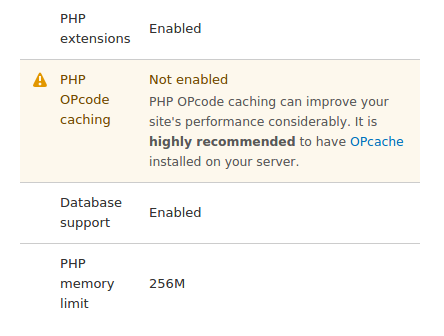05 Jun 2020
PHP OPcode caching Drupal 9 solved

PHP OPcode caching on Drupal 9
Drupal is perfect and best CMS , i love it, but long time i not work with drupal bout i try and learn new generation CMS and static site generator like gatsby js, jekyll angular and more.
Drupal one of my favorite for develope website project, i use drupal CMS @2012 - 2015, on 2016 i have stop to update
another website, cause i'm very bussy with my job, and on 2019 i back again to learn another cms for develope website,and wow... I was very surprised by the development of technology. many significant changes and especially the emergence of the latest generation of flatfile cms to static sites generator , and for the first time I was shocked by Jekyll, how fast he was and this was a breakthrough that was really new to the generation of websites. After that, I was surprised again by the presence of Gatsby who was getting crazy in my opinion, this is really fast and even without loading. and in November 2019 I returned to learn more about the development of the website, including studying jekyll, gatsby js, angular , laravel to ionic and darts.
for the beginning it was very difficult considering I had not run and made a project for a long time and in fact almost never touched with coding.and after learning it and falling asleep, I missed Drupal again. I visited the Drupal website and saw some changes from Drupal, because I missed this so I decided to install Drupal to the local host. I downloaded Drupal version 9 and installed it, but the installation did not run smoothly with the error appearing as follows:PHP OPcode caching. what to do in the initial installation of this error ??
The first step - first turn off your XAMPP engine including apache server and mysql, find and enter the php.ini file then add the following code.
zend_extension=php_opcache.dll
[opcache]
; Determines if Zend OPCache is enabled
opcache.enable=1
; Determines if Zend OPCache is enabled for the CLI version of PHP
opcache.enable_cli=0
; The OPcache shared memory storage size.
opcache.memory_consumption=64
; The amount of memory for interned strings in Mbytes.
opcache.interned_strings_buffer=4
; The maximum number of keys (scripts) in the OPcache hash table.
Only numbers between 200 and 100000 are allowed.
;opcache.max_accelerated_files=2000
; The maximum percentage of "wasted" memory until a restart is scheduled.
opcache.max_wasted_percentage=5
; When this directive is enabled, the OPcache appends the current working
; directory to the script key, thus eliminating possible collisions between
; files with the same name (basename). Disabling the directive improves
; performance, but may break existing applications.
opcache.use_cwd=1
; When disabled, you must reset the OPcache manually or restart the
; webserver for changes to the filesystem to take effect.
;opcache.validate_timestamps=1
; How often (in seconds) to check file timestamps for changes to the shared
; memory storage allocation. ("1" means validate once per second, but only
; once per request. "0" means always validate)
;opcache.revalidate_freq=2
; Enables or disables file search in include_path optimization
;opcache.revalidate_path=0
; If disabled, all PHPDoc comments are dropped from the code to reduce the
; size of the optimized code.
;opcache.save_comments=1
; If disabled, PHPDoc comments are not loaded from SHM, so "Doc Comments"
; may be always stored (save_comments=1), but not loaded by applications
; that don't need them anyway.
;opcache.load_comments=1
; If enabled, a fast shutdown sequence is used for the accelerated code
;opcache.fast_shutdown=0
; Allow file existence override (file_exists, etc.) performance feature.
;opcache.enable_file_override=0
; A bitmask, where each bit enables or disables the appropriate OPcache
; passes
;opcache.optimization_level=0xffffffff
;opcache.inherited_hack=1
;opcache.dups_fix=0
; The location of the OPcache blacklist file (wildcards allowed).
; Each OPcache blacklist file is a text file that holds the names of files
; that should not be accelerated. The file format is to add each filename
; to a new line. The filename may be a full path or just a file prefix
; (i.e., /var/www/x blacklists all the files and directories in /var/www
; that start with 'x'). Line starting with a ; are ignored (comments).
;opcache.blacklist_filename=
; Allows exclusion of large files from being cached. By default all files
; are cached.
;opcache.max_file_size=0
; Check the cache checksum each N requests.
; The default value of "0" means that the checks are disabled.
;opcache.consistency_checks=0
; How long to wait (in seconds) for a scheduled restart to begin if the cache
; is not being accessed.
;opcache.force_restart_timeout=180
; OPcache error_log file name. Empty string assumes "stderr".
;opcache.error_log=
; All OPcache errors go to the Web server log.
; By default, only fatal errors (level 0) or errors (level 1) are logged.
; You can also enable warnings (level 2), info messages (level 3) or
; debug messages (level 4).
;opcache.log_verbosity_level=1
; Preferred Shared Memory back-end. Leave empty and let the system decide.
;opcache.preferred_memory_model=
; Protect the shared memory from unexpected writing during script execution.
; Useful for internal debugging only.
;opcache.protect_memory=0
after that, update and save the php.ini file , then run your XAMPP machine again and access via localhost and Viola your Drupal installation is works , just shared about PHP OPcode caching Drupal 9 solved
 How to fix deploy angular on netlify
How to fix deploy angular on netlify Install add bootstrap to next js
Install add bootstrap to next js Blazor peforma mu gak bahaya ta??
Blazor peforma mu gak bahaya ta?? Cara agar iframe bootstrap jadul lama menjadi responsive.
Cara agar iframe bootstrap jadul lama menjadi responsive. Mengatasi building development bundle error.
Mengatasi building development bundle error. Web Modern Built time yang Horor banget !!
Web Modern Built time yang Horor banget !! Rent Car CMS free download full source code
Rent Car CMS free download full source code Why my pico website is display blank white ??
Why my pico website is display blank white ?? Mengetahui Status Sitemap pada Google Search Console
Mengetahui Status Sitemap pada Google Search Console Cara melakukan update gatsby cepat dan mudah
Cara melakukan update gatsby cepat dan mudah Error digital envelope
Error digital envelope Error svelte adapater build
Error svelte adapater build



 About kasir apps online
About kasir apps online Ang application ng cashier ng restawran at shop
Ang application ng cashier ng restawran at shop Aplikasi Bengkel Software Program Bengkel
Aplikasi Bengkel Software Program Bengkel Aplikasi Bisnis Office
Aplikasi Bisnis Office Aplikasi kasir bill restoran online murah
Aplikasi kasir bill restoran online murah Alarm Security
Alarm Security Aplikasi
Aplikasi Aplikasi Akuntansi
Aplikasi Akuntansi Aplikasi Grosir dan Eceran Toko
Aplikasi Grosir dan Eceran Toko Aplikasi Invoice
Aplikasi Invoice
